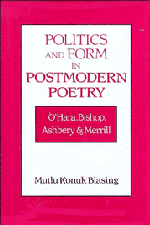Book contents
- Frontmatter
- Contents
- Acknowledgments
- Introduction: Poetry after Modernism
- Frank O'Hara: “How Am I to Become a Legend?”
- Elizabeth Bishop: “Repeat, Repeat, Repeat; Revise, Revise, Revise”
- John Ashbery: “The Epidemic of the Way We Live Now”
- James Merrill: “Sour Windfalls of the Orchard Back of Us”
- Notes
- Works Cited
- Index
- CAMBRIDGE STUDIES IN AMERICAN LITERATURE AND CULTURE
James Merrill: “Sour Windfalls of the Orchard Back of Us”
Published online by Cambridge University Press: 12 March 2010
- Frontmatter
- Contents
- Acknowledgments
- Introduction: Poetry after Modernism
- Frank O'Hara: “How Am I to Become a Legend?”
- Elizabeth Bishop: “Repeat, Repeat, Repeat; Revise, Revise, Revise”
- John Ashbery: “The Epidemic of the Way We Live Now”
- James Merrill: “Sour Windfalls of the Orchard Back of Us”
- Notes
- Works Cited
- Index
- CAMBRIDGE STUDIES IN AMERICAN LITERATURE AND CULTURE
Summary
No one has accused James Merrill of being postmodern. Yet his poetry most clearly flouts modernist poetic assumptions at the same time that his noncanonical use of canonical forms will not reduce to a reactionary formalism. His work challenges the dominant critical readings of the aftermath of modernism and demands that we rethink the models of literary history and change with which we have read American poetry since World War II. While Merrill inhabits conventional metrical and stanzaic forms without much anxiety, his verse also registers its historical position of coming after modernism, and its importance lies in its questioning novelty, progress, and modernity – the very possibility of new beginnings. Merrill's postmodernism, then, is not merely a late phase of modernism but represents a challenge to the ideology of modernity. His anachronistic gestures, which invoke traditional forms and subjects while rendering them problematic, resist progressive history and nostalgia alike and remain only gestures of tradition and form, rather than aiming for substantive recuperations of the past. Such formalism not only precludes any easy equation of a set of techniques with a particular politics but escapes any simple model of progressive literary history, which can only view the use of traditional forms as reactionary. Thus his work exemplifies the anachrony of a nonprogressive change that revises modernist models.
When an interviewer suggests to Merrill in 1967 that a period of consolidation set in after World War II in the wake of modernism, he responds: “As for consolidation, I'm not so sure.
- Type
- Chapter
- Information
- Politics and Form in Postmodern PoetryO'Hara, Bishop, Ashbery, and Merrill, pp. 156 - 198Publisher: Cambridge University PressPrint publication year: 1995



